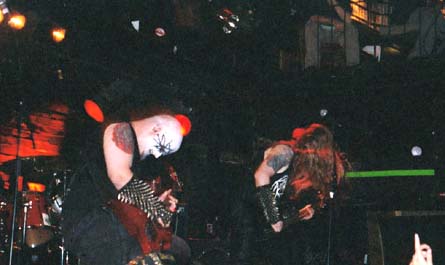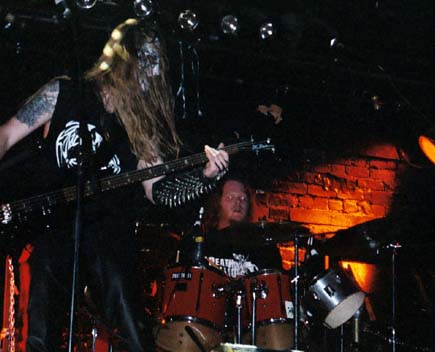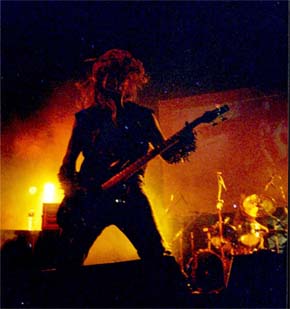Acerbus have for some time been the enigma of the Texas scene: music that takes the furthest extension of death metal extremity known to humanity, the technical deathgrind genre, and expands it with a progressive and conceptually advanced edge that leaves most typical listeners of any genre standing open-mouthed. Well-versed in conventional music, Acerbus are exploring for new ground, and we were lucky to be able to talk to guitarist Cory during a break from his rocket science experiments. “Can the man behind the mask answer a few questions?”

What do you see as the distinction between art and entertainment, if one exists?
I definitely think a dichotomy between art and entertainment exists. I believe that art is a mental expression through your physical self, releasing any number of emotions, creative ideas, or in some cases rather scientific musical ideologies based on charted biological responsive “information.” I believe that entertainment is more based around the ever-popular biological survival ticket, or the dollar. Entertainment is something that 47-year-old men sit around in boardrooms concocting trying to blend the perfect ideas to entertain the masses and rake in an easy 1.5 billion in 2 weeks. You know, prime time television shows, game shows, reality shows, family movies, blockbusters, etcetera.
Do you believe art begins as a conception independent of its medium, or is it strictly configurations within the medium that inspire an aesthetic appreciation?
I believe that this varies from individual artist to individual artist. Speaking personally it’s a mixture of the two. Without a doubt it’s more of an inspired aesthetic appreciation and vision yet independent conceptualism does play its roll in some of my song writing. As in extremely awkward things that related none what so ever, not even related percussivly to music induces a spawning of musical ideas.
Do you think it’s possible that a band make significant art with only a handful of power chords?
It all depends on your definition of “art”. It’s like a space-time continuum paradox similar to Schrodinger’s Cat or Einstein’s mouse. I mean, the most beautiful and amazing piece of art to me could be garbage to you, so it’s possible or impossible depending on your perception of what art is. Short answer Yes with a capital N and long answer No with a capital Y.
Are emotions part of the logical process of the mind in your opinion, or are they of the mind?
I think that emotions are stuck somewhere in our time-evolved mammalian primitive minds. They are thoughts that cause nothing more that problems and weakness yet they are necessary so that the human DNA strand will survive and not kill itself off. It was VERY smart and sneaky of our DNA strands to slip that anti self-destruct mechanism into our biological programming.
Are you a materialist (no other words besides this one) or do you have any forms of transcendent mystical belief?
In no way am I a materialist. I do have what I believe is a very open minded transcendent belief. A belief really consisting nothing more that knowing that there are an infinite amount of possibilities and a complete void of fact behind any of them. Even if there were “facts” remember what a very smart man once said, “There are no facts, only interpretations.”
Marijuana seems to be a divine substance to many. So you think this is an accident of nature, something we’ve conditioned ourselves to find, or an accidental property of the substance – or another possibility?
I was actually discussing this yesterday. Once again, there are millions of scenarios containing endless amounts of speculation within each but I will tell you about an interesting theory that I had on the subject. Say the earth is a living organism. Thriving physically and possessing an extremely advanced consciousness that of which is beyond our imaginations or comprehension, i.e., growing wood on its surface for its experiment “humans” to use to build devices to help them live easier therefore longer. It distanced itself the seemingly PERFECT distance from the sun so with its what we see as annual rotation calculated its experiment could live comfortably under the climate conditions. Basically, the miracle plant is just another thing that the earth has grown for us as it watched its experiment get more and more hostile toward one another and boxed into ridiculously small reality tunnels. The growing of the plant by the earth provides its experiment with calmness, happiness, heightened physical pleasure and expanded thinking modulation to help shatter some of those miniscule sized reality tunnels that the humans that are too scared of their own existence want you to reside in forever. But hey, it actually doesn’t sound that far from the truth does it? (You know you read too much philosophy when you answer a question with a question! HA!)
What would your ideal lifestyles be, if you were exempted from the problems of resource scarcity?
I would begin by eliminating 90% of the population, which would be a huge step in the right direction of an ideal lifestyle. Other than that, all I would really yearn for is to be alone in a huge building consisting of a giant music and book library, a state of the art professional studio and a musical instrument library consisting of every instrument in existence. I suppose a gigantic INSIDE pool heated to 98 degrees would be in order as well. I love water. Looking at it, being in it (when it’s clean), drinking it, and thinking about it. It’s pretty amazing to me. It’s the mystery substance!
Do you think some bands are better at aesthetics than music, and should be lauded for opening doors that musically competent descendants will explore? (Think: Venom)
My answer to that question is a rather repugnant one in that I do not approve of artists that rely strictly on aesthetics because 9 times out of 10 that reeks of gimmick. Yet as you noted bands of that illustration have opened doors for artists who have created relevant and meaningful art. Therefore, I think that the grandfather artist (ones of aesthetic dependence) should not be glorified simply due to the fact that their gimmicky “act” unbeknownst to them happened to influence an artist of substance to create something momentous.
What do you see as the ideological, musical and social roots of the death metal movement?
I think that bands such as Deicide, Suffocation, Carcass, Morbid Angel (barf), and Napalm Death fundamentally established the foundation of the death metal movement. Actually, I think almost every new band’s ideologies and “social” roots (not something I enjoy at all in the death metal world) are still somehow based and JUDGED (its VERY harsh these days) on what thoughts the revolutionaries first had. It’s as if these bands created a steel mold for the rules of the genre and all that really happens even after 10 years of existence is bands just filling that mold and ever so slightly expanding on it. That’s definitely something I try to focus on during song writing, to try something new for the genre, and by new I don’t necessarily mean undistorted jazzy fills and adagiated bridges but just in a compositional manner or how the over all conception of the endless possibilities of an instrument are conceived. I think that some people that have yet to get up and peek out of the top of that mold that they’ve been sitting in the bottom of for the last few years will be jaded by this but I think the genre will dry up, get old and fizzle out if some people don’t start having an open mind about the genre’s amazing possibilities and its future and if someone doesn’t have the gallantry to take a chance on expanding the genres limits. You know you can only eat your favorite food everyday for lunch for so many years before it become bland and uninteresting. Music needs spicing up ever so often just like food.
In your opinion, what are the primary musical differences in form between black metal and death metal?
First, touching lightly on the more prominent definitions of the metal genre, and what I would look at as somewhat stating the obvious to any competent individual, I think that DM’s energy is generally fueled more by gore and technicality and BM’s energy is usually fueled more by rage (as blind and unguided as it may be sometimes). The vocal style usually sticks out like a sore thumb as DM vocals prefer the guttural growls or pig noises and BM vocals usual prescribe to the high screechy or I just slammed my genitals in a sliding glass door vocal style. BM guitars are generally consisted of standard tunings, which goes along with the high screechy vocals, where DM bands enjoy the tuned down sound (which in my opinion has become rather ridiculous these days. ACERBUS tunes to CFA#D#GC which is two full steps down on each string and that isn’t really considered that low in comparison to some bands in modern times), once again the deep guitars are coinciding with the vocal style.
Now to get slightly more in depth with my segregation descriptions, I will try to expand more. The musical stylings that I hear in BM songs are primarily composed of mutated minor chords. Quite often I find BM bands utilizing natural minor chords, which lacks a major seventh. While “eerie” or “whiney” sounding it provides no real power or emphasis to the root note of the chord. Harmonic and Melodic minor chords are intermingled with the natural minors to provide power and still retain a “dark” sound. These Harmonic and Melodic minor chords are used to strengthen the minor keys, there for giving way for some dark powerful sounding riffing. As far as an individual riffing style I think audibly there is an obvious sound that is generally more “open” and “breathing” even a somewhat dissonant and definitely more disharmonious sound with a tendency to move in shapes and patterns based on a full note chord to a two and a half step dropped minor chord reverting to the previous full chord with a slight half step rise minor alteration then reverting back to a lower minor chord plus and uncontrolled arpeggiation to follow with implied and increased attack to end and finally execute one performance of a riff. As far as a BM orchestration goes, I think BM focuses more on long-winded repetitious movements using the vocal pattern as lead point of which to follow and adhere to, almost defined as a somewhat deranged classical definition of the term symphony.
I think that the majority of death metal band’s riffing focuses on using diatonic chords intermingled with modulated minor pentatonic single notes tremolo picked scales to provide a constantly powerful, even, and bludgeoning barrage of whole note patterns and movements. Unlike BM, DM bands are not partial to letting songs “breath” or become “dissonant”. DM bands are usual very heavily infatuated with a song structure that has no musical “holes”, or a lack of sonic intensity at anytime in anyway. Unfortunately, I think during composition a lot of DM bands lose sight of the meaning behind the word orchestration. Ive noticed that a lot of DM bands just seem like the write 50 riffs, put them into a hat and randomly pull them out in no order yet string them all together using drums fills.
Today there are plenty of modest and worthy laboreres among scholars, too, who are happy in their little nooks; and because they are happy there, they sometimes demand rather immodestly that one ought to be content with things today, generally — especially in the domain of science, where so much that is useful remains to be done. I am not denying that; the last thing I want is to destroy the pleasure these honest workers take in their craft: for I approve of their work. But that one works rigorously in the science and that there are contented workers certainly does not prove that science as a whole poesses a goal, a will, an ideal, or the passion of a great faith. The opposite is the case, to repeat: where it is not the latest expression of the ascetic ideal–and the exceptions are too rare, noble, and atypical to refute the genreal proposition–science today is a hiding place for every kind of discontent, disbelief, gnawing worm, despectio sui, bad conscience–it is the unrest of the lack of ideals, the suffering from the lack of any great love, the discontent in the face of involuntary contentment.
– F.W. Nietzsche, Genealogy of Morals
Is there such a thing as musical novelty? (a combination of notes striking or distinctive for purely musical reasons, with no other implications) or do you attribute what is commonly identified as such as being more of a stylistic novelty?
Yes, but I don’t think it is as much a musical novelty as it is a programmed effect that has thwarted us as time and “standards” have evolved. It’s almost more of a comforting thing to the ears of the close-minded more than a stylistic redundancy. Over time people have been “programmed” to recognize what sounds “correct” and “incorrect” in music, and really all other aspects of life as well. It’s quite a shame but its true. Certain progressions of musical notes or chords have been labeled “incorrect” because to most people they sound “ugly” (minor chords, several notes played at once which are out of key with on another), while others are considered beautiful (whole note chords, several notes played in octave). They both sound beautiful to me, just different. Who are we to say that certain notes grouped together are right or wrong? My interpretation of this ridiculous dilemma is that it clearly seems as if this musical decision coincides with the rest of general human ideology. Humans are always trying to label “beautiful” or “normal” people/animals good and “ugly” or “different” people/animals bad. This reflects onto all aspects of general human thinking so why not let it bleed into music as well? We are brainwashed into thinking that what is disharmonious is “bad” and what is harmonious is “good”. Some people might think its preposterous for me to make a statement such as this but I think its preposterous for people to be trapped in a musical box which has been assembled by their “peers” and guaranteed by record labels which focus on the business of music rather than the music of music.
 In ancient Greece, poetry was considered incomplete without accompanying music which united the significance of the words with the significance of certain tones and musical shapes. Is there any relevance of this idea today?
In ancient Greece, poetry was considered incomplete without accompanying music which united the significance of the words with the significance of certain tones and musical shapes. Is there any relevance of this idea today?
I think so. Music completes life. Certain songs complete and are appropriate for every, and any occasion. The choice of this music is, of course, up to the individual and will never be the exact same for any two people. I’m generally awake 19 or 20 hours every day and there is literally no more than two hours or so of my day, everyday, that is void of music. Working in a music store definitely contributes to my habits.
What inspired you about the deathgrind genre, or was it a culmination of other influences?
It has been countless influences, and the influences that influenced the people that influenced me. As Einstein said, you must honor the gift of evolution that is life, which has been worked on diligently for millions of years. People often tend to look that fact of existence over. I try to take the same approach to music, it seems like great men in the past have already done all of the really hard things in music for me and I think that now, anyone who picks up a musical instrument is on easy street in comparison to these previous achievements. Do you know off the top of your head who invented the first sound recording device?
I will try and stop from getting to far away from the question at hand and get back to my most prominent influences. I guess in the very beginning, 6 years ago, when I was 14 years old and had picked up a guitar for the first time, I was worshiping 3 bands. The Jimi Hendrix Experience, Primus, and Deicide. I loved the sound experimentation and groundbreaking abstracting of music that Hendrix had, I loved the sense of humor and unconventuallity of Primus, and the aggression and technicality of Deicide. Those are the bands that made me want to pick up a guitar and that eventually drove me to create a band of my own that I wanted to contain all of the things that drew me to my early influences, in one single band. Now days the only thing that REALLY inspires me is avant-garde classical composers, i.e., Philip Glass, John Cage, Steve Reich, Kronos Quartet, ect.
What do you normally listen to in your time off from being death metal terrorists?
Actually, I enjoy listening to almost every genre of music. I really like Modern Psychedelic music, tons of obscure Classical composures, truck loads of Jazz and all of its sub-genres, of course Metal, Electronic music, Meditation music, Noise artists, and International (there are some really amazing eastern musicians). The list really has no end. What I’m listening to from each genre always changes but I can give you some things that are currently finding their way off the shelf into my CD player.
Kronos Quartet – “Black Angels”
Tan Dun – “Ghost Opera”
Suffocation – “Peirced from Within” and “Effigy of the Forgotten”
Jonas Hellborg/Shawn Lane/Jim Sipe – “Personae” and “Zenhouse”
Uncle Moe’s Space Ranch – “self-titled”
Clinic – “Walking with Thee”
Godspeed You Black Emperor – “Lift Your Skinny Fists Like Antennas To Heaven”
Philip Glass “Glassworks”
John Cage “The Seasons” (Margaret Leng Tan’s toy piano piece is amazing!)
Flaming Lips – “Soft Bulletin” and “Yoshimi Battles the Pink Robots”
Autechre – “Gantz Graf” and “Tri Repeatae”
Gyorgy Ligeti – “Ligeti Project II”
Medeski Martin and Wood – “The Dropper” and “Uninvisible”
John Zorn/Mike Patton – “Hemophiliac”
Pat Martino – “Live at Yoshi’s”
John Adams “Naive and Sentimental Music”
Primus “Pork Soda” and “Sailing the Seas of Cheese”
Nusrat Fateh Ali Khan – “Body and Soul”
Anoushka Shankar – “self-titled”
That’s what ive listened to heavily this week, but like I said the list is ever changing and I have a ton of CDs or so, so I’m always listening to something different.
Is there such a thing as political ideas expressed in art, or do you see there being a necessary connection between political ideas -> social ideas -> perceptive concepts?
There are political ideas expressed in art and rightfully so. Political ideas need expressing so why not use one of the most affective methods of convoying ideas as your medium?
I know you bastards read philosophy; what are your favorites? What did they express that was not seen articulated elsewhere?
Yes indeed. I guess a few favorites are Friedrich Nietzsche’s “Thus Spake Zarathustra”, Immanuel Kant’s “Critique of Pure Reason” (if you can make it through this book, read it again and ponder each line he writes, as each sentence holds at least a paragraph’s worth of metaphorical ideology. I own the Cambridge edition, it is abridged appropriately and edited in a way which makes the text easier {well I should say possible for most people to understand} for those who haven’t taken a Kantian philosophy course.), and while it is sort of a culmination of such topics as physics, philosophy, non-Aristotelian logic and semantics, I enjoy Alfred Korzybski’s “Science and Sanity.” I enjoy most titles by Robert Anton Wilson dealing with philosophy/consciousness expanding. While I believe most of his books are nothing more than other peoples’ ideas funneled down and regurgitated so people with “lesser intellectuality” can understand them and begin the process of consciousness expanding. Normally I would disagree with this method of funneling information/writing but he actually notes when he is taking from someone else’s thoughts or literature so that makes it valid in my eyes. His books are fun to read, he makes good points and has a great sense of humor. Stephen Hawking’s book, “A Brief History of Time” is good for the most part. I could go on forever here but I will list another good one, Carl Sagan’s “Demon Haunted World: Science as a Candle in the Dark.” To answer your second part to this question would be a whole other interview. The ideas expressed in these books that were not articulated elsewhere are so deep, vast and lengthy that a summarization of all of these individual ideas within a few pathetic sentences typed by myself, to me, would be an insult to the writers who I look at as some of the intellectual iron men of writing. Although, I believe a quick summary to someone who is interested and has never read or heard of any of these books is due. As basic and stripped down as it can be put, the over all point of all of these books is to force the reader to look at life in a different light. Metaphorically speaking, your mind is like a parachute. Closed you will die, open it will save your life and you will float above as you watch the others hit the ground screaming.
In spiritual practice, which is more important: coherence with natural schema of patterning, or symbolic adherence to human desires?
I think both are equally unimportant. Both are nothing more than a subconscious choice that is made of how a person perceives and interprets his/her own reality based on how their brain programs cropped and filed away the information of spirituality that has been directed to them and imprinted in their brains based on what experiences and information (or misinformation, really) they happen to come in contact with during their life that has consequently shaped their perception and beliefs according to these random events.
What do you think about Falun Gong?
From what I have read or been told about falun gong it’s really nothing more than Chinese yoga for people whose reality is based on pseudoscience. I know it involves physical postures accompanied by mediation which will supposedly promote mental/spiritual well being. I read an article in a magazine once with the “leader” stating by mastering falun gong you can obtain such metaphysical abilities as levitation and other supernatural powers. In my eyes, falun gong is as ridiculous as any other type or brand of a spiritual salvation that is defined by one living person (on an upside, at least their “leader” isn’t fictitious). Master Li, the “leader”, is the only person who can define the ways of F.G. therefore the ideology immediately causes me to burst into laughter and look at F.G. as nothing more than another man (Li) who is probably semi-intellectual who uses shills to control the minds of the mentally weak and needy. To me, the idea that a carbon based life form is to be looked at as a bringer of salvation is hilarious, pathetic and simultaneously horrifying in the fact that there are about 2 million people in the world that prescribe to the theory of falun gong. It’s a shame our species has bred beings that believe one of their own kind could be their bringer of salvation and are so mentally weak and distorted that they are sucked into a thin, as in lacking of content and containing no scientific relevance, vision of salvation in hopes of obtaining “supernatural” powers for no more than time and a likely weekly fee. I think the first step in demystifying any method that promises to bring salvation is if biological survival tickets (money) fit into the equation. I would imagine that a being that brings salvation would not be of biological content therefore would have an absent need for our (note the first word after the parenthesis) biological survival tickets.
Do you have any opinions of pornography? Do you feel it turns humans into symbolic structures in the same way religion does?
I think pornography is humorous. Not really from the point of view of the female who is baring her hide but from the male’s perspective. I think guys and women alike who enjoy pornography are either not aware of certain aspects of their existence or the worse scenario, are aware yet don’t care. Males tend to drool, stew, fantasize and obsess over pictures of naked females and critique their body in comparison to their personal preferences. Here is where the humor comes in. What males don’t realize whilst they enjoy porno is all they are doing is acting as the primates that they are, filled with a genetic structure that does not want to die out therefore possesses the constant need and want to reproduce. For example, when a guy says, “that bitch is hot”, unbeknownst to him he is thinking “the fat distribution and reproductive organs of the opposite sex in my sight seem extremely healthy and from what I’m perceiving visually has the ability to provide extremely healthy children for me.” When a guy looks at a pair of naked breasts he quivers, when in actuality that thought of lust running through his mind is nothing more that his deeply rooted and distilled thought that these mammary glands (plump breasts) will provide perfect sustenance for his offspring therefore promoting the longevity of his DNA strand, which is the most important aspect of a living organism. Apply this ideology to all other focuses of lust and there is a similar truth such as above behind each one. Peacocks spread their feathers to show the females the array of colors and the amount and fullness that their feathers possess which is a trait of a healthy male that in turn attracts the female, just as the human male works out, combs his hair, and wears becoming clothing etcetera, to attract the female. Unfortunately cars, money and so on are signs of power and well being which also attracts the human female. This is where the humor in pornography lies for me. When some pathetic male is gawking at or masturbating to a photo of a naked women he has no idea he is simply bleeding for his master, the DNA strand that is programmed to reproduce at all costs. Just as it is stereotypical for a male to feel and act “Zen-like” and feel necessary to reminisce of his previous nights copulative affairs with other males. He is satisfied physically that he has fulfilled his biological purpose in life and must tell the other males in his “tribe” of his affairs to gain a top dog status. Watching or hearing of these events provide me with endless laughter and entertainment; therefore the idea of pornography is extraordinarily humorous to me.
Another counsel of prudence and self-defense is to react as rarely as possible, and to avoid situations and relationships that would condemn one to suspend, as it were, one’s “freedom” and initiative and to become a mere reagent. As a parable I choose asociation with books. Scholars who at bottom do little nowadays but thumb books–philologists, at a moderate estimate, about 200 a day–ultimately lose entirely their capacity to think for themselves. When they don’t thumb, they don’t think. They respond to a stimulus (a thought they have read) whenever they think–in the end, they do not but react. Scholars spend all of their energies on Yes and NO, on criticism of what others have thought–they themselves no longer think.
The instinct of self-defense has become worn-out in them; otherwise they would resist books. The scholar –a decadent.
I have seen this with my own eyes: gifted natures with a generous and free disposition, “read to ruin” in their thirties — merely matches that one has to strike to make them emit sparks — “thoughts.”
Early in the morning, when day breaks, when all is fresh, in the dawn of one’s strength — to read a book at such a time is simply depraved!
– F.W. Nietzsche, Genealogy of Morals
 What activities do you have outside of music?
What activities do you have outside of music?
I don’t do a lot that doesn’t relate to music in some way. I enjoy drawing, writing text in a style I call “metaphilosophtry”, which is a mixture of metaphor, philosophy and poetry. I love reading philosophy, physics, and psychology books and really enjoy psychotropic experiences. Not sleeping much and drinking lots of coffee fits in there. I rarely go “out” as I hate loud noises (yes I know its sort of contradictory to being in a band but loud music is the only loud noises that are enjoyable to me) or being around people. Other than that there isn’t much I do that doesn’t have to do with music in some way or another.
What do you do to relax and have fun?
Well, there is the obvious, I play in Acerbus, I write music at my home and record various guitar or keyboard pieces on my digital studio. I try and have an intellectually stimulating conversation with someone every now and then. I’m quite the hermit and often refer to myself as a “misanthropic nihilistic introvert”. I love studying and thinking about the psychology involved with musical notes and progressions and I suppose the previous question will answer the rest.
If music is a language, what distinguishes certain pieces as impressive relates to the poetic content they express. Is there a difference between content and form in music?
I definitely think that certain progressions or orchestrations in musical notes, patterns of notes or chords will draw out certain emotions or trigger thought patterns that are unique to each listener. This is where my main interest in music lies. With every piece of music I write I keep in mind how it (the piece) will affect the listener on individual levels as well as in cohesion with the rest of the composed piece. I hope this is subconsciously apparent to people who listen to Acerbus. When people come to me after our shows they will tell me that we just sound “different” and that they cant quite place their finger on what it is but we just sound “different” to them. Hopefully this is a result of my psychological study of music at play since I write music utilizing certain aspects and attacking the listener’s ear in such a way that their brain cant help but to register these sounds on their musical spectrum as “new”, hence people telling me Acerbus just sounds “different” to them. Hopefully this method is at play but one can never be absolutely sure.
What’s wrong with humanity?
Do you want me to write a 2000 page essay here? I’ll give it to you as stripped down as possible. Humans have “evolved” to a biological life form that holds horrible traits called narcissism, ego, deceitfulness and personal dogma. America has arrived at a point where everything is based on biological survival tickets (money) and milking and flexing the primitive aspects of humans for all that their worth. Everyone in America (99%) has the mindset as follows: me first, I’m right you’re wrong, I am not successful without loads of money, I must outdo everyone else in the world on every level to retain top dog status, I’m the most important being on the face of this planet that would shrivel and die if I were to cease to exist. It’s sad really because life would be grand if everyone would drop all of this self important hogwash and read a book about, or at least an introduction to non-Aristotelian thought. Unfortunately, this will never happen so I say it would be in our best interests as a species to destroy all existing political and social parties and try to start over again with an actual democracy instead of one that spoon feeds its residents the illusion of freedom, the illusion of choice and the illusion of safety.
if you could be one non-human species (imagine reincarnation or other “magical” occurrence) what would it be?
I’d settle on being a viperfish. There are amazing and undiscovered things in the deep sea that would provide an infinite amount of eye candy for me as I enjoy looking at things and pondering on them. Having photophores that cause light to emanate from your body using bioluminescence would be amazingly amusing. Knowing reality as an air breathing life form would make living underwater very interesting. As an added bonus viperfish are extremely gnarly looking so that is a definite plus for me as well.
Which book would you most likely have written, not being already given to a career in musicianship?
Without a doubt I would have written, “Prometheus Rising” by Robert Anton Wilson. It’s a great book that anyone on any intellectual level can understand that will help him or her expand his or her reality tunnel resulting in higher intelligence, understanding of their self and others and awareness of one’s own biological nature and an introduction to the ways brain programs work. All things I think humanity could use sorely at this current time.
 What do you think of the Austin scene? Do you think a city’s collective attitude determines what music will emerge?
What do you think of the Austin scene? Do you think a city’s collective attitude determines what music will emerge?
I’ve gotten asked this question EVERY interview I have ever done since Austin has the reputation for being the “live music capitol of the world”, which is total bullshit (there is probably at least 200 bands that play in clubs all over Austin every night, it doesn’t mean that they have any real musical substance to them), so forgive me for not elaborating in great lengths one this one. Let me say this, we play a lot of out of town shows and most of the people that are into underground metal in Austin are in bands. I think the attitude of a city has little effect on what bands will emerge. I see where bands from certain areas have certain “sounds” but I think that is probably just a factor due to a psychosomatic suggestion that bands from certain cities hold a certain sound that must be emulated. I’m sure bands from the same areas experienced the same influences and I would imagine that would have something to do with it as well.
Do you see yourselves as expressing the ideas of your environment, or reacting to those ideas? (not to be confused with reactionary opposition, or an emotional/irrational response of rejection)
I guess I create music based on my influences, perceptions of what I think is musically divine, my own thoughts and on what ways I think that music can and needs to evolve.
Do you plan to have a family and “normal” life, if the opportunity rises?
No. An American “normal” life is nothing more than the lowest common denominator.
When you are playing, do you visualize the difference between the shapes you are touching/pressing on the fretboard, or do you have another method of preparing for the radical sweeping fretruns that seem to be easy for you?
This is a hard question to answer, but I will do my best. I hope my response remains coherent to everyone because I know exactly what I’m talking about but it’s difficult to put certain brain/body functions in to text form. When playing I visualize geometric patterns on the fretboard that are segregated in a grid-like pattern (as in each fret contains 6 lines which can be looked at in cohesion with all others as a giant piece of graph paper, each line holds a tone and is programmed into my brain accordingly) with the boundaries for each possible note change being each fret and string. This method of playing is extremely critical during my four fingered tapping solos. Most times when I play I do it in a sort of subconscious manner, I just kind of let me hands go to work. The best comparison is typing on a computer keyboard; each key is assigned a certain character just as each string is assigned a different note. Certain words you type, after typing them a few times become natural and this allows you to type in a fluid and fast way. This is just like how I play guitar. After I write a guitar riff the hand movements that are necessary to create the sound of the riff become like a stamp. Once it’s forged all you have to do is apply it and its there in perfect relief. The assemblage of many riffs, rhythm, transitional or lead, form together as one giant hand pattern or in other words about 40 different “riffs” or stamps compiled will create one giant “stamp” or song. I think that is the best I can explain it. I hope it made sense.
When you interact with normal people, how much do you self-censor what you’re going to say?
Unfortunately I do. I don’t censor what is considered “foul” language but I majorly censor what I would like to say intellectually. While people are talking they generally want their opinion to be heard and they don’t want to feel inferior. If I say something to someone that is what I consider a slightly deep thought, people will most times not understand you and think your just trying to be a “know it all”. So whilst in conversation with people whether it is friends or strangers I just strip down what I’m thinking so everyone understands and no one feels left out forcing them to lie their way through a topic since humans can’t stand admitting to not knowing something. I consider doing this a social Valium, but I never said I had the best social skills.
If you make people feel that they know something, they will adore you, if you make people realize they know nothing, they will loathe you.
What does Acerbus do to prepare for a concert?
We all stretch our muscles, tune our instruments, and arrive at a mentally self-confident state of readiness. Larry prescribes to the athletic abstinence of all physical indulgences theory for several weeks before any show or recording. I suppose that is all.
Have any labels woken up and signed you yet?
No. I have sent promotional packages to countless labels but every response I have gotten has been that we are too “extreme” or “out there” to bring in a large quantity of sales therefore the labels are unwilling to take a chance. I guess I’m out of touch with the metal community because I thought in the early nineties when Suffocation, Carcass and Deicide were breaking new ground being as extreme as possible was the name of the game. I don’t mean this in an egotistical way at all but I’m not worried: I know we will get signed eventually its just a matter of when and who is willing to take a chance.
What do you see as the primary differences between classical music and jazz?
Another essay style answer is in order here but I’ll try and keep it to a few sentences. This will probably only be funny to 1 out of 10,000 people but here it goes… I’ll try and be “the minimalist” while answering this question about classical music. HAHAHA! Man that’s funny in a cheesy way! Anyway, most Classical music is very refined and often referred to as “educated” music that is based on theory and what is “correct” (except for my favorites), while jazz is a style of music, while still well refined, is characterized by improvisation and experimentation. Hopefully everyone reading this already knows this fact but the alternate definition to the word “jazz” is miscellaneous or unspecified things. There we go, short and sweet and without speculation as promised.
What are the most significant musical innovations in the last fifty years, in your opinion?
This is another hard question to answer, but I’ll give you the most prominent things that stick out in my mind. The invention of several instruments (electronic and others) has done music well. The fact that in the last 20 years musical genres seem to have been mixed up a lot more. Unfortunately, this genre mixing has not been good all the way around but it has produced a few gems. It’s like mixing paint colors together, if you do it right you get vibrant unique colors. If you do it wrong you get brown. I can tell you some artists that I think have really pushed the limits of music as a whole in the last 50 years. Philip Glass (whom I happen to be listening to as I answer this interview), Steve Reich, Jimi Hendrix, John Cage, Miles Davis, Ornette Coleman, John Zorn, Primus, John Coltrane, Black Sabbath, Thelonious Monk and the Kronos Quartet. These are just a few but I think that they have all have had a profound impact on music over the last 50 years.
Do you feel ambient music brings any theoretical change or alterations in form to popular music, and, if so, what do they signify in the mental processes of artists in this time?
Slightly, and by that I mean everything has an effect on everything. Any slight alteration or event will affect an infinite number of reactions that will cause change throughout the world. Introducing new musical ideas or genres will work in an identical fashion.
Is history cyclic, linear, or linear within cyclic? Please explain.
The thought of history being cyclic is not feasible to me. Charting reoccurring events and loosely comparing them to more recent events suggesting the idea that history is cyclic is very similar to people who believe in psychics or faith healers. Weak-mindedness and deluding myself into believing coinciding similar facts cause factual relevance in certain events is not something I’m a fan of. Believing that history is linear within cyclic patterns sounds like someone who is one the edge a cliff preparing to jump off but just can’t quite do it yet. I think history is linear and I think people that believe history is cyclic could probably be diagnosed with infophobia and need to get hobbies, try pseudoscience it will be right up your alley.
How do you reconcile the view that art is a matter of individual interpretation (#2) with the idea that all listeners are affected similarly by certain musical combinations (#1)?
A sense of relief falls upon me to discover that the perceiver asks for further information on questions that have what could be seen as contradictorily answers. I will attempt an explanation using metaphor with promises that my answer remains coherent. Imagine bottles of paint and a mixing palette. Each base color in the each bottle (red, green, blue, yellow) is pure and unaltered such as an un-interpreted message to your brain. Any disturbance to this pure thought or “pure color” (which represents and un-interpreted brain message) will cause the same amount of change to the final interpreted message (“mixed primary paint colors” or a thought that has been altered by your minds own personal perception. ) in the outcome. So, the fact that I stated that “art is a matter of individual interpretation”, resembles how everyone’s “final perception” or, a thought that has gone through your brain programs thus the outcome will vary based upon each individual’s “reality tunnel” or, the way they perceive reality. Now, when I say “all listeners are affected similarly by certain musical combinations” I mean that if I can find musical combinations that actually change the original unperceived signal (which is the same for everyone), then the outcome will be slightly different, yet different in the same way for everyone. I will explain again in a different manner to promote the illumination of my point. Imagine having 10 painters that are all using the same paint bottles. You tell them to mix the colors on their own palettes and to each paint a landscape. Therefore, each painter s final picture will be different based upon his or her perception of a landscape. Now to change each painter’s painting without changing their interpretation of the landscape we would change the base colors from red, blue, yellow and green to black, purple, orange and brown which would cause the same change to each painters painting without changing their perception of their landscape.
 There’s too much to talk about, and I’ll keep asking questions forever. Is there anything else you’d like to add for benefit of broadcast to the world?
There’s too much to talk about, and I’ll keep asking questions forever. Is there anything else you’d like to add for benefit of broadcast to the world?
Thank you for reading the entire interview, I’m glad you made it all the way through! Thanks to SRP for writing an interview that owns questions of substance and once again I appreciate anyone spending the time to read this. Anyone should feel free to contact me if they wish: Acerbus@angelfire.com
Thanks Again for your time!
Cory
-ACERBUS-
1 Comment Averse Sefira is one of a half-handful of north american bands who create something other than three-chord punk disguised as black metal. What drives you to take a mental vision and project it through music, instead of creating a variant on known musical patterns? How did you collaborate on this vision, and what was the course of its evolution?
Averse Sefira is one of a half-handful of north american bands who create something other than three-chord punk disguised as black metal. What drives you to take a mental vision and project it through music, instead of creating a variant on known musical patterns? How did you collaborate on this vision, and what was the course of its evolution? WRATH: So few people are savvy enough to recognize that christianity is a way of thinking, now more than ever. One can still be christianized and never say a prayer, set foot in a church, or even believe in Jehova. It is christian to demand that everyone be treated with the same regard and merit even when it is unwarranted. It is christian to rationalize behavior that stands in flagrant opposition with professed beliefs, the most common example in the underground being anti-christian yet having a christian significant other (most guys take what they can get without question). It is christian to compromise even when it is clear that the ends will not justify the means. Whether or not the Norse bands were truly adherent in their ideals, their music and words stood firmly against this. Too few really read Euronymous’ mission statement and understood its intent. The Norwegian movement was meant to put a stop to the open door policy of the current scene and implement a new variation that was not intended for everyone. Here again we return to the idea of elitism and why it is so necessary. As previously addressed, the traditional underground still holds these values closely for good or ill, as it is often rigorous to do so when glad-handing scensters continue to get in the way. I agree with Nietzsche’s outlook in this regard; it is particularly true in the US where christian sentiments have long subverted more sensible and functional means and values. Things here no longer run smoothly, as “being fair” or worrying about “people’s feelings” undermines common sense when it comes to getting anything accomplished. Conversely, the whole model is illusory in that so few who enforce these conventions truly believe in them. They assume the person next to them does, however, and thus they adopt a position that will ensure the least amount of judgment or sanctions. This, in its most rudimentary sense, is Christianity — servility for the promise of a nebulous reward.
WRATH: So few people are savvy enough to recognize that christianity is a way of thinking, now more than ever. One can still be christianized and never say a prayer, set foot in a church, or even believe in Jehova. It is christian to demand that everyone be treated with the same regard and merit even when it is unwarranted. It is christian to rationalize behavior that stands in flagrant opposition with professed beliefs, the most common example in the underground being anti-christian yet having a christian significant other (most guys take what they can get without question). It is christian to compromise even when it is clear that the ends will not justify the means. Whether or not the Norse bands were truly adherent in their ideals, their music and words stood firmly against this. Too few really read Euronymous’ mission statement and understood its intent. The Norwegian movement was meant to put a stop to the open door policy of the current scene and implement a new variation that was not intended for everyone. Here again we return to the idea of elitism and why it is so necessary. As previously addressed, the traditional underground still holds these values closely for good or ill, as it is often rigorous to do so when glad-handing scensters continue to get in the way. I agree with Nietzsche’s outlook in this regard; it is particularly true in the US where christian sentiments have long subverted more sensible and functional means and values. Things here no longer run smoothly, as “being fair” or worrying about “people’s feelings” undermines common sense when it comes to getting anything accomplished. Conversely, the whole model is illusory in that so few who enforce these conventions truly believe in them. They assume the person next to them does, however, and thus they adopt a position that will ensure the least amount of judgment or sanctions. This, in its most rudimentary sense, is Christianity — servility for the promise of a nebulous reward.
 Some have said the Christian vision of the “soul” is nothing more than the ego yearning to assert itself despite mortality. Do you think this is true? The ego is also paradoxical, in that it is both useful and, if too much of it occurs, destructive. Is there a general principle that can be derived from this?
Some have said the Christian vision of the “soul” is nothing more than the ego yearning to assert itself despite mortality. Do you think this is true? The ego is also paradoxical, in that it is both useful and, if too much of it occurs, destructive. Is there a general principle that can be derived from this? Do you believe in the soul?
Do you believe in the soul?

